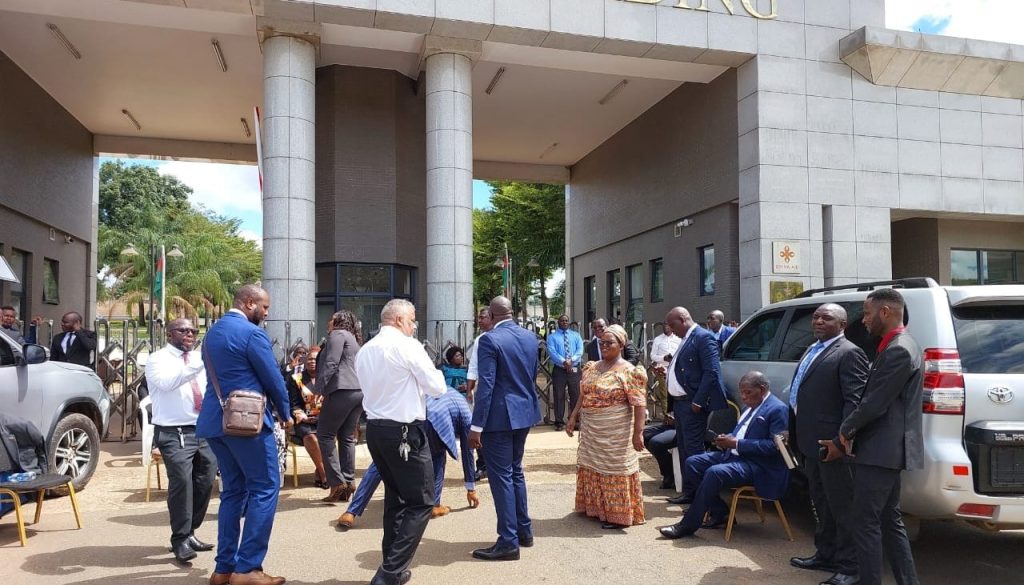Chimwemwe Kandodo
Political Science Department, The Catholic University of Malawi
- Introduction
The Democratic Progressive Party (DPP), a major opposition force in Malawi, has been
embroiled in a prolonged state of conflict since 2020. The conflict revolves around leadership
struggles within the party. Initially the party was led by Professor Bingu wa Mutharika, who
governed the country until his death in 2012. The party was thrown to opposition when Joyce
Banda rose to presidency following the death of Bingu wa Mutharika. The DPP returned to
power in 2014 under the leadership of Professor Arthur Peter Mutharika, the brother of the
previous president of DPP, who defeated in a general election the then sitting president, Joyce
Banda. The conflict in the DPP appears to have reached its climax with the recent expulsions and
suspensions of its members on the grounds of not respecting the party structures.
Conflict, as defined by various sources (courses.lumenlearning.com; helpguide.org), manifests as
disagreements between individuals or groups, and its nature can vary widely. Conflict analysis,
as a structured process, aims to understand the profile, actors, causes, and undercurrents defining
conflicts (Conflict Sensitivity Consortium, 2012).
According to Puneja (2015), conflicts manifest in five successive phases. The prelude stage
serves as an introduction to conflict, characterized by the emerging of differences in interests and
a lack of coordination among parties involved. Subsequently, conflicts are often characterised by
triggering events, marking the second phase, which escalates further tension between the entities.
As conflicts progress, their presence becomes more noticeable, accompanied by warning signs
such as heated arguments and verbal confrontations; this is called the initiation phase. The
differentiation phase then follows, during which the underlying causes and contributing factors
of the conflict become clearer and are expressed by involved parties. Finally, in the resolution
phase, conflicting parties actively engage in seeking solutions and reconciliation. These phases
provide a structured framework for understanding the evolution of conflicts and offer insights
into potential means for finding a resolution. - Context
The DPP was established in 2005 by Bingu wa Mutharika following disputes with his
predecessor Bakili Muluzi, a key founding member of the United Democratic Front (UDF).
Formation of the DPP eroded the political standing of the UDF in the country with numerous
defections of key members of the UDF to DPP. Despite considerable opposition and political
destabilization in the country, President Bingu wa Mutharika’s leadership, was characterised by
2
significant development initiatives, including the construction of key infrastructure. Arguably,
the DPP under President Arthur Peter Mutharika manifested a significant shift in dimension of
leadership characterised by governing the country without direct budgetary support. Despite
being somewhat development oriented, as portrayed by its two previous presidents, the
unresolved conflicts within the DPP continues to hinder its ability to effectively execute its role
of holding the government accountable, posing a threat to Malawi’s young democracy.
- Conflict issues
The primary cause of conflict within the DPP is leadership disputes. Senior members aspire to
the party presidency, while the incumbent leader seeks re-election in the upcoming 2025 general
elections, a prospect met with discontent within certain party factions. Consequently, internal
divisions have deepened, leading to frequent confrontations, prolonged legal battles, and in some
cases, violence among party members. Fundamental to these conflicts is the question of party
ownership. Is the current leader aiming to pass leadership to a relative or one of his cronies? The
unanswered questions are sparking objections from longstanding party members who feel
entitled to the position. - Actors
Key actors in the foregoing intra-party conflict include the current party president, Professor
Arthur Peter Mutharika, the ousted Vice President for the Southern Region Kondwani
Nakhumwa, the Eastern Region Vice President Mr. Bright Msaka, and former Reserve Bank
Governor Dr. Dalitso Kabambe. - Conflict resolution
Clearly, addressing the conflict within the DPP is crucial to prevent further erosion of trust and
potential party divisions. Negotiation, mediation, or arbitration present viable approaches to
resolution in the party. Negotiation involves inclusive discussions to address concerns and find
common ground. If negotiation fails, mediation by a neutral third party may facilitate
reconciliation. Arbitration, utilizing a neutral arbitrator, offers a binding decision for all parties
involved. - Conclusion
In conclusion, the present conflict analysis report highlights the intra-party strife within the
Democratic Progressive Party, that is undermining not only its effectiveness as the main
opposition party but also the democratic progress in the country. Resolution through negotiation,
mediation, or arbitration is long overdue for the party’s unity and functionality as the country
heads towards the general elections next year. - References
i. Puneja (2015) Understanding Conflict, Meaning, and Phases of Conflict.
ii. Conflict Sensitivity Consortium (2012)
iii. Various online sources cited within the text.

